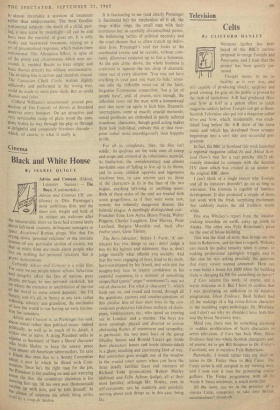Cinem a
Black and White House
By ISABEL QUIGLY
its subject are welcome after the innumerable films we have had around lately about left-bank students, delinquent teenagers or (Pace Accattone) Roman pimps. Not that I'm crying down 'personal relations' or the intrinsic interest of any particular section of society, but that so many films are made about people ple who on nothing but personal relations that it grows monotonous.
Certainly Advise and Consent is a solid film. For once we see people whose actions, behaviour and integrity affect the fate of nations, puny People, perhaps, by any personal yardstick, but on whom the existence or annihilation of the rest of the world to some extent depends: the US Senate; and it's all, in theory at any rate, rather sobering, salutary and grandiose, the mechanics bow the world is run having an eerie fascina- tion for outsiders. Advise and Consent is, as Preminger has said, about moral rather than political issues—indeed Politically, strikes one as well as in much of its detail, it as naïve. A dying President seeks to appoint as Secretary of State a liberal character who looks likelier to keep the uneasy peace than stouter all-American sabre-rattlers. To save a friend this man lies to a Senate Committee about a past in which he flirted with Com- in*,_urlisin. Since he's the right man for the job, _Luse President is for pushing on and not worrying about the lies; the committee chairman is for Showing him up, till his own past (homosexual) catches up with him, and he kills himself. At the climax of suspense the whole thing settles it self by a coup de thddtre. Advise and Consent CX' cer- tificate) is Otto Preminger's most ambitious film, and the sheer size, weight and bulk of It is fascinating to see (and clearly Preminger is fascinated by) the mechanism of it all, the rings within rings, the small men with their enormous but so carefully circumscribed power, the bulldozing tactics of political necessity and the cruel choices that so often crunch up indivi- dual lives. Preminger's cool eye looks at the overheated events, and he records, without com- ment, dilemmas conjured up to fox a Solomon. As the plot alone shows, the whole business is contrived to squeeze the last drop of dramatic irony out of every situation. 'You may not have anything in your past you want to hide,' some- one tells the inflexible noses'-out of the faint, forgotten Communist connection, 'but a lot of people have'; and, of course, sure enough, the inflexible turns out the man with a homosexual past that turns up again to kick him. Dramatic interruptions come at exactly crucial moments; moral problems are embodied in neatly tailored situations; characters, though good acting makes them loOk individual, embody this or that view- point rather more unambiguously than happens in life.
For all its complexity. then, the film isn't subtle : its qualities are the wide ones of sweep and scope and control of its voluminous material, its limitations , the complementary and almost inevitable ones of failing to live up to its theme, and its acute, childish squawks and ingenuous reactions (not, in case anyone says so, those of the charaCters in it) in the face of the two bogies, anything left-wing or anything queer. Both of these states of the soul are treated with acute gingerliness, as if they were some rare, remote, but infinitely dangerous disease, like bubonic plague. A dazzlingly distinguished cast : Franchot Tone, Lew Ayres, Henry Fonda, Waiter Pidgeon, Charles Laughton, Don Murray. Peter Lawford, Burgess Meredith and, back after twelve years, Gene Tierney.
The Boys- (director: Sidney J. Furie; 'A' cer- tificate) has two things to say: don't judge a boy by his haircut and sideburns; that is, don't judge morally what offends you socially. And that the most engaging of boys, kind to his mum, hero-worshipped by his friend, and with just the naughty-boy face to inspire confidence in his essential soundness, in a moment of something unspecified (panic? anger? resentment?), may act cut of character. For what is `character"?—which leads you on, and round and round, through all the questions, answers and counter-questions of this circular film of four slum boys in the con- ventional proletarian full-dress uniform of drain- pipes, winklepickers, etc., who spend an evening out in London; and a murder. The boys are most cunningly played and directed to arouse alternating flushes of resentment and sympathy; in particular, the two main boys of the group (Dudley Sutton and Ronald Lacey) get inside their characters' bones and boots (elastic-sided) in a glum, touching and convincing kind of way. But conviction goes straight out of the window in the crucial court scenes when you have the three deadly familiar faces and manners of Richard Todd (prosecution), Robert Morley (defence) and Felix Aylmer (judge), all at their most familiar; although Mr. Morley, even in self-caricature, can be suddenly and painfully moving about such things as, in this case, being fat.










































 Previous page
Previous page